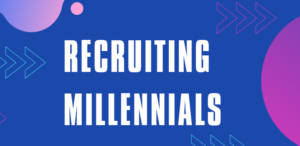
Millennials are a generation that have grown up in a different world than those before them. Due to that, companies need to alter the way they attract this generation. As of 2015, Pew Research has reported that they are now the most prevalent of all the generations in the workforce. If you don’t have a plan to recruit Millennials, here are some ways you can start!
Why Recruit Millennials?
There are several reasons why companies should recruit millennials:
Tech Savvy: Millennials are digital natives and tend to be very comfortable with technology. They can bring valuable skills and knowledge to a company in terms of digital marketing, social media, and data analysis.
Diverse perspectives: Millennials are the most diverse generation in the workforce and can bring new perspectives and ideas to a company.
Entrepreneurial mindset: Many millennials have a strong entrepreneurial mindset and can bring a sense of innovation and creativity to a company.
Strong work ethic: Despite the stereotypes, many millennials are highly motivated and driven in their careers, and can make valuable contributions to a company.
Social and environmental awareness: Millennials tend to be more socially and environmentally aware than previous generations, and may be more likely to support and promote a company’s CSR initiatives.
Flexibility: Millennials value flexibility in their work and look for companies that offer flexible working arrangements, such as remote working or flexible hours.
Future leaders: As the majority of the workforce, millennials will be the future leaders in many companies, and it’s important to bring them in early to groom them for leadership positions.
By recruiting millennials, companies can access a diverse and talented pool of potential employees who can bring fresh perspectives and valuable skills to the organization.
1. How to Reach Them
Traditional methods like posting your opening on job sites like Monster likely won’t guarantee Millennials will see it. Savvy recruiters know that they need to use sites that this group is attracted to. In addition to posting roles on Indeed, LinkedIn and CareerBuilder head to the social media sites to reach them. Think about using Facebook, Snapchat, Twitter, and Instagram in your recruiting arsenal. You can post updates when you start recruiting for a new role to share with your followers and can even spring for an online ad to reach more of an audience.
2. Focus on Sharing Content
Don’t solely focus on just posting your job. Write articles and share content that would interest candidates. Millennials are known for flocking to companies that offer more than just a salary. Share events that the company enjoys like volunteer events and work parties. Give them a glimpse of the workplace culture that they can enjoy if they come to work for you. Videos and visuals are attractive additions to posts and will grab their attention.
3. Be Active Online
Millennials know how to research companies they are considering working for. Make sure you pay attention to sites like Glassdoor which allow employees and former employees to rate their company. Read reviews and make sure the page is accurate in terms of the benefits your company offers. If there are negative reviews with a theme, see what could possibly be done to address the issues. LinkedIn also has the ability to create a company page. Try adding videos that candidates can watch to get an insight to what the company offers.
4. Authenticity Is Key
Millennials, like most people, don’t care for being sold something only to receive something else. Don’t sell the company as something it isn’t. Be real with what the job will be and what opportunities they will have to grow. Focus on the positives of your company and why you think it is a great place to work. Be straight with the negatives as well and let them make the decision on whether it is the right place for them.
Millennials you already have on staff will tell their friends how it really is, so avoid painting a picture that doesn’t ring true. It will be sure to turn them off if they hear an alternate picture. Forbes also points out that job descriptions need to be clear. It’s frustrating to read a job description but have it be so generic you can’t tell what you would do on a day to day basis. Keep it clear to get the best results.
Recommended Reading:
Top 12 Contact Finding Extensions for 2023
How to Deliver a Swift Talent Pipeline?
How ChatGPT May Push Talent Sourcing into a Future State
- AI Search Will Transform Talent Sourcing Forever - January 10, 2025
- Build an AI Sourcing Assistant using ChatGPT 4 - January 10, 2025
- Top Recruiting Leaders to Follow in 2025 - January 8, 2025
